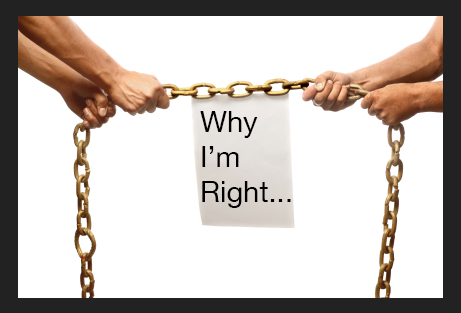
What are my biases?
Do I express strong bias that could cause polarization of those who do not agree with me?
How to detect your expression of bias:
Words. Our own language can provide a flashlight into the recesses of our own motivations.
- Absolute Language. The words you use are clues that you are expressing a bias that will not be well received by those who do not share your bias. Absolute language such as “any”, “all”, “always” may appeal to those who share your bias – it’s sort of like ‘preaching to the choir’. Using strong words may win you praise from fans but will most likely alienate those you might be hoping to sway towards your way of thinking.
- Framing inferences as facts. This can include inferring the motivation of others, or making inferences based on the lack of actions of others.
- Framing your own motivation positively. E.g. I seek solely to find “objective truth.”
- Broadening conclusions. For instance, painting someone as a ‘dictatorial ideologue relentlessly oppressing humble and honest scientists in order to ensure the only messages that survive are self-serving propaganda’ is usually a stretch.
Questions to help me examine my bias:
- How might my own beliefs be coloring my advocacy? If I use absolute language and state inferences as facts I could be reducing my effectiveness in sharing what I believe to be true.
- Do I feel insulted or offended when others do not share my views or challenge my points?
- Are there times when I overstate my data?
- Do I sometimes approach a conversation with a predetermined opinion, then back into arguments that support it? Even a little?
- Can I read the science from the opposing position? Do I rate the quality of research higher because of feelings about a particular author or conclusion? Is there a body of science I feel loyalty or affection for?
Other clues that highlight your bias:
- Do you dismiss scientific papers that don’t agree with your beliefs?
- Can you impartially evaluate the quality of the research in a paper?
- Can you listen without interrupting when someone expresses an opposing point of view?
- Do you maintain objectivity in your decision making process?
- The most pernicious kind of subjectivity comes from those who think they are objective.
- Can we move beyond self-righteousness in our ideology?
I find that if I have crafted a story in my mind that makes me the righteous victim and others the premeditated villains, I am likely to have little influence with them, or to their adherents. To the degree you can come to see the failings of others as temptations you also occasionally succumb to, you’ll humanize the opposition and amplify your prospects of healthy conversation.
One of the best ways to resolve conflict is to transcend it. If this is an issue that is extremely important to you, or important for someone you love, try to step off of your high horse and seek to have a mutually respectful conversation. Here are some ideas I’ve gleaned from communication specialists:
- Find a time when you are not debating a specific topic or specific paper.
- Open the conversation by acknowledging frequent conflict about topics in the past. Acknowledge any transgressions in your own approach to those conflicts.
You might say, for example, “I experience our decision making conversations as more contentious than is helpful. I know I’ve contributed to that. There are times when I let my ego trump my objectivity. I feel insulted and defensive, and that’s my stuff. And I suspect I’m not the only one. I suggest we step away from the specifics for a few minutes and discuss our purpose and our mutually shared goals. Let’s find principles that we both agree on such as the robust health of our children. My hope is that if we can all commit to those principles and stay to our convictions, we will reduce unnecessary conflict.”
It could well be that in the conversation you discover an unapologetic commitment of the other person to support only a particular bias. If so, you have a decision to make.
If, on the other hand, the conversation leads to purposeful and meaningful conversation with a discovery of shared purpose and principles that will guide the interactions, you will then have a context within which to challenge decisions that don’t fit with your mutually shared principles and hopefully come to a resolution.
I acknowledge great insight gleaned from https://www.vitalsmarts.com/crucialskills/2020/02/unconscious-bias-in-science/#comment-13183
Previously I wrote some ideas on having discussions with those you love on hard topics that has reached 2,400 people.

Becky Hastings, wife, mother, grandmother, passionate follower of Jesus and truth. As a breastfeeding counselor for over 23 years Becky is devoted to helping parents make wise decisions for the long-term health and wellbeing of their babies. As a member of a Vaccine Safety Education Coalition, Becky writes and speaks on the topic of vaccine safety.
